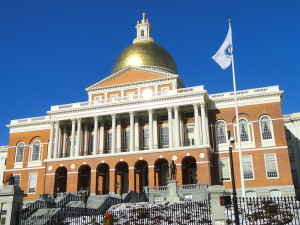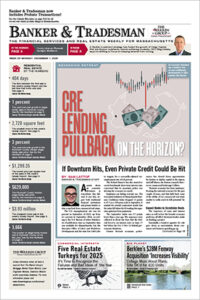Business organizations urged Beacon Hill legislators to pause approval of a new property tax structure raising rates on commercial properties in Boston following the release of new assessment data.
The data indicates that residential homeowners would face lower tax increases than previously estimated, prompting Mayor Michelle Wu and business groups to debate whether the burden would be tolerable.
A coalition of business groups including the Greater Boston Chamber of Commerce, developer trade group NAIOP-MA, the Boston Municipal Research Bureau and the Massachusetts Taxpayers Foundation all endorsed the compromise version in October, which Senate President Karen Spilka had indicated was necessary to gain her support.
But Wednesday, the group announced the latest assessment data was “materially different” from the figures presented by the administration in October.
“Based on these revised figures, we support pausing consideration of Boston’s home rule petition that would shift property taxes onto commercial property owners to allow time to analyze the impact of the new information,” the group said in a statement.
State Sen. Nick Collins, D-South Boston, held up final passage of Boston’s Home Rule petition this week, citing the need for more study.
Collins twice blocked a vote on the three-year increase of the maximum tax shift onto commercial properties, most recently Thursday morning after the state Department of Revenue certified Boston’s property valuations.
Among opponents’ concerns: A successful bid by Boston to raise taxes on commercial property beyond what state law normally allows will embolden the city’s suburbs to do the same.
Deal’s Fate Comes Down to the Wire
But even as the coalition that inked October’s tax rate deal was urging a pause, NAIOP-MA’s fellow real estate trade group, the Greater Boston Real Estate Board went further. GBREB wasn’t party to October’s deal, and had so far avoided publicly commenting on it. Only the much smaller rental landlord trade group Small Property Owners Association vocally opposed it.
“The Legislative process should be reconsidered as it appears that there is a very real possibility the need to change the law through this home rule petition is no longer a necessity,” GBREB CEO Greg Vasil said in a statement. “Allowing the current law to remain in effect would limit the burden on the already-struggling commercial real estate sector, which continues to grapple with post-pandemic trends like the rise in remote work.”
Boston Assessing Commissioner Nicholas Ariniello said Tuesday state legislators will need to approve the deal by Monday in order for the City Council to act at its Wednesday meeting. Any later and residents’ January tax bills won’t reflect the agreement.
Wu has fought for the temporary shift to avert what she calls an excessive hike in residential property taxes, which will be required to assume a larger portion of the overall tax levy as commercial property values decrease. Commercial real estate accounts for a majority of the property tax revenue stream, and office and lab building values have decreased since 2020 due to declining occupancy and rental income.
The average residential tax bill would increase 14 percent annually without the new formula, according to previous estimates. The latest data indicated closer to an 10.5 percent hike, only slightly above the historical average increase of 9 percent over the last five years.
With the home rule petition passage, the average residential property tax increase would be 5.2 percent annually, the administrated estimates.
In a letter to Senate leadership issued Thursday, Wu appealed for passage of the October compromise, noting that average annual tax increases for residents over the past decade were 5 percent.
“Residents in other Greater Boston municipalities have averaged tax increases at or less than 5 percent, including Salem which has seen an average 3 percent increase and Newton which has seen an average 5 percent increase,” the letter states.
Banker & Tradesman staff writer James Sanna contributed to this report.







